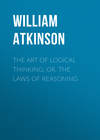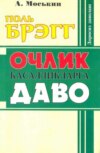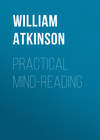Kitabı oku: «The Art of Logical Thinking; Or, The Laws of Reasoning»
CHAPTER I.
REASONING
"Reasoning" is defined as: "The act, process or art of exercising the faculty of reason; the act or faculty of employing reason in argument; argumentation, ratiocination; reasoning power; disputation, discussion, argumentation." Stewart says: "The word reason itself is far from being precise in its meaning. In common and popular discourse it denotes that power by which we distinguish truth from falsehood, and right from wrong, and by which we are enabled to combine means for the attainment of particular ends."
By the employment of the reasoning faculties of the mind we compare objects presented to the mind as percepts or concepts, taking up the "raw materials" of thought and weaving them into more complex and elaborate mental fabrics which we call abstract and general ideas of truth. Brooks says: "It is the thinking power of the mind; the faculty which gives us what has been called thought-knowledge, in distinction from sense-knowledge. It may be regarded as the mental architect among the faculties; it transforms the material furnished by the senses … into new products, and thus builds up the temples of science and philosophy." The last-mentioned authority adds: "Its products are twofold, ideas and thoughts. An idea is a mental product which when expressed in words does not give a proposition; a thought is a mental product which embraces the relation of two or more ideas. The ideas of the understanding are of two general classes; abstract ideas and general ideas. The thoughts are also of two general classes; those pertaining to contingent truth and those pertaining to necessary truth. In contingent truth, we have facts, or immediate judgments, and general truths including laws and causes, derived from particular facts; in necessary truth we have axioms, or self-evident truths, and the truths derived from them by reasoning, called theorems."
In inviting you to consider the processes of reasoning, we are irresistibly reminded of the old story of one of Moliere's plays in which one of the characters expresses surprise on learning that he "had been talking prose for forty years without knowing it." As Jevons says in mentioning this: "Ninety-nine people out of a hundred might be equally surprised on hearing that they had been converting propositions, syllogizing, falling into paralogisms, framing hypotheses and making classifications with genera and species. If asked whether they were logicians, they would probably answer, No! They would be partly right; for I believe that a large number even of educated persons have no clear idea of what logic is. Yet, in a certain way, every one must have been a logician since he began to speak."
So, in asking you to consider the processes of reasoning we are not assuming that you never have reasoned – on the contrary we are fully aware that you in connection with every other person, have reasoned all your mature life. That is not the question. While everyone reasons, the fact is equally true that the majority of persons reason incorrectly. Many persons reason along lines far from correct and scientific, and suffer therefor and thereby. Some writers have claimed that the majority of persons are incapable of even fairly correct reasoning, pointing to the absurd ideas entertained by the masses of people as a proof of the statement. These writers are probably a little radical in their views and statements, but one is often struck with wonder at the evidences of incapacity for interpreting facts and impressions on the part of the general public. The masses of people accept the most absurd ideas as truth, providing they are gravely asserted by some one claiming authority. The most illogical ideas are accepted without dispute or examination, providing they are stated solemnly and authoritatively. Particularly in the respective fields of religion and politics do we find this blind acceptance of illogical ideas by the multitude. Mere assertion by the leaders seems sufficient for the multitude of followers to acquiesce.
In order to reason correctly it is not merely necessary to have a good intellect. An athlete may have the proper proportions, good framework, and symmetrical muscles, but he cannot expect to cope with others of his kind unless he has learned to develop those muscles and to use them to the best advantage. And, in the same way, the man who wishes to reason correctly must develop his intellectual faculties and must also learn the art of using them to the best advantage. Otherwise he will waste his mental energy and will be placed at a disadvantage when confronted with a trained logician in argument or debate. One who has witnessed a debate or argument between two men equally strong intellectually, one of whom is a trained logician and the other lacking this advantage, will never forget the impression produced upon him by the unequal struggle. The conflict is like that of a powerful wrestler, untrained in the little tricks and turns of the science, in the various principles of applying force in a certain way at a certain time, at a certain place, with a trained and experienced wrestler. Or of a conflict between a muscular giant untrained in the art of boxing, when confronted with a trained and experienced exponent of "the manly art." The result of any such conflict is assured in advance. Therefore, everyone should refuse to rest content without a knowledge of the art of reasoning correctly, for otherwise he places himself under a heavy handicap in the race for success, and allows others, perhaps less well-equipped mentally, to have a decided advantage over him.
Jevons says in this connection: "To be a good logician is, however, far more valuable than to be a good athlete; because logic teaches us to reason well, and reasoning gives us knowledge, and knowledge, as Lord Bacon said, is power. As athletes, men cannot for a moment compare with horses or tigers or monkeys. Yet, with the power of knowledge, men tame horses and shoot tigers and despise monkeys. The weakest framework with the most logical mind will conquer in the end, because it is easy to foresee the future, to calculate the result of actions, to avoid mistakes which might be fatal, and to discover the means of doing things which seemed impossible. If such little creatures as ants had better brains than men, they would either destroy men or make them into slaves. It is true that we cannot use our eyes and ears without getting some kind of knowledge, and the brute animals can do the same. But what gives power is the deeper knowledge called Science. People may see, and hear, and feel all their lives without really learning the nature of things they see. But reason is the mind's eye, and enables us to see why things are, and when and how events may be made to happen or not to happen. The logician endeavors to learn exactly what this reason is which makes the power of men. We all, as I have said, must reason well or ill, but logic is the science of reasoning and enables us to distinguish between the good reasoning which leads to truth, and the bad reasoning which every day betrays people into error and misfortune."
In this volume we hope to be able to point out the methods and principles of correctly using the reasoning faculties of the mind, in a plain, simple manner, devoid of useless technicalities and academic discussion. We shall adhere, in the main, to the principles established by the best of the authorities of the old school of psychology, blending the same with those advanced by the best authorities of the New Psychology. No attempt to make of this book a school text-book shall be made, for our sole object and aim is to bring this important subject before the general public composed of people who have neither the time nor inclination to indulge in technical discussion nor academic hair-splitting, but who desire to understand the underlying working principles of the Laws of Reasoning.
CHAPTER II.
THE PROCESS OF REASONING
The processes of Reasoning may be said to comprise four general stages or steps, as follows:
I. Abstraction, by which is meant the process of drawing off and setting aside from an object, person or thing, a quality or attribute, and making of it a distinct object of thought. For instance, if I perceive in a lion the quality of strength, and am able to think of this quality abstractly and independently of the animal – if the term strength has an actual mental meaning to me, independent of the lion – then I have abstracted that quality; the thinking thereof is an act of abstraction; and the thought-idea itself is an abstract idea. Some writers hold that these abstract ideas are realities, and "not mere figments of fancy." As Brooks says: "The rose dies, but my idea of its color and fragrance remains." Other authorities regard Abstraction as but an act of attention concentrated upon but the particular quality to the exclusion of others, and that the abstract idea has no existence apart from the general idea of the object in which it is included. Sir William Hamilton says: "We can rivet our attention on some particular mode of a thing, as its smell, its color, its figure, its size, etc., and abstract it from the others. This may be called Modal Abstraction. The abstraction we have now been considering is performed on individual objects, and is consequently particular. There is nothing necessarily connected with generalization in abstraction; generalization is indeed dependent on abstraction, which it supposes; but abstraction does not involve generalization."
II. Generalization, by which is meant the process of forming Concepts or General Ideas. It acts in the direction of apprehending the common qualities of objects, persons and things, and combining and uniting them into a single notion or conception which will comprehend and include them all. A General Idea or Concept differs from a particular idea in that it includes within itself the qualities of the particular and other particulars, and accordingly may be applied to any one of these particulars as well as to the general class. For instance, one may have a particular idea of some particular horse, which applies only to that particular horse. He may also have a General Idea of horse, in the generic or class sense, which idea applies not only to the general class of horse but also to each and every horse which is included in that class. The expression of Generalization or Conception is called a Concept.
III. Judgment, by which is meant the process of comparing two objects, persons or things, one with another, and thus perceiving their agreement or disagreement. Thus we may compare the two concepts horse and animal, and perceiving a certain agreement between them we form the judgment that: "A horse is an animal;" or comparing horse and cow, and perceiving their disagreement, we form the judgment: "A horse is not a cow." The expression of a judgment is called a Proposition.
IV. Reasoning, by which is meant the process of comparing two objects, persons or things, through their relation to a third object, person or thing. Thus we may reason (a) that all mammals are animals; (b) that a horse is a mammal; (c) that, therefore, a horse is an animal; the result of the reasoning being the statement that: "A horse is an animal." The most fundamental principle of reasoning, therefore, consists in the comparing of two objects of thought through and by means of their relation to a third object. The natural form of expression of this process of Reasoning is called a Syllogism.
It will be seen that these four processes of reasoning necessitate the employment of the processes of Analysis and Synthesis, respectively. Analysis means a separating of an object of thought into its constituent parts, qualities or relations. Synthesis means the combining of the qualities, parts or relations of an object of thought into a composite whole. These two processes are found in all processes of Reasoning. Abstraction is principally analytic; Generalization or Conception chiefly synthetic; Judgment is either or both analytic or synthetic; Reasoning is either a synthesis of particulars in Induction, or an evolution of the particular from the general in Deduction.
There are two great classes of Reasoning; viz., (1) Inductive Reasoning, or the inference of general truths from particular truths; and (2) Deductive Reasoning, or the inference of particular truths from general truths.
Inductive Reasoning proceeds by discovering a general truth from particular truths. For instance, from the particular truths that individual men die we discover the general truth that "All men must die;" or from observing that in all observed instances ice melts at a certain temperature, we may infer that "All ice melts at a certain temperature." Inductive Reasoning proceeds from the known to the unknown. It is essentially a synthetic process. It seeks to discover general laws from particular facts.
Deductive Reasoning proceeds by discovering particular truths from general truths. Thus we reason that as all men die, John Smith, being a man, must die; or, that as all ice melts at a certain temperature, it follows that the particular piece of ice under consideration will melt at that certain temperature. Deductive Reasoning is therefore seen to be essentially an analytical process.
Mills says of Inductive Reasoning: "The inductive method of the ancients consisted in ascribing the character of general truths to all propositions which are true in all the instances of which we have knowledge. Bacon exposed the insufficiency of this method, and physical investigation has now far outgrown the Baconian conception… Induction, then, is that operation by which we infer that what we know to be true in a particular case or cases, will be true in all cases which resemble the former in certain assignable respects. In other words, induction is the process by which we conclude that what is true of certain individuals of a class is true of the whole class, or that what is true at certain times will be true in similar circumstances at all times."
Regarding Deductive Reasoning, a writer says: "Deductive Reasoning is that process of reasoning by which we arrive at the necessary consequences, starting from admitted or established premises." Brooks says: "The general truths from which we reason to particulars are derived from several distinct sources. Some are intuitive, as the axioms of mathematics or logic. Some of them are derived from induction… Some of them are merely hypothetical, as in the investigation of the physical sciences. Many of the hypotheses and theories of the physical sciences are used as general truth for deductive reasoning; as the theory of gravitation, the theory of light; etc. Reasoning from the theory of universal gravitation, Leverrier discovered the position of a new planet in the heavens before it had been discovered by human eyes."
Halleck points out the interdependence of Inductive and Deductive Reasoning in the following words: "Man has to find out through his own experience, or that of others, the major premises from which he argues or draws his conclusions. By induction we examine what seems to us a sufficient number of individual cases. We then conclude that the rest of these cases, which we have not examined, will obey the same general laws… The premise, 'All cows chew the cud,' was laid down after a certain number of cows had been examined. If we were to see a cow twenty years hence, we should expect that she chewed her cud… After Induction has classified certain phenomena and thus given us a major premise, we proceed deductively to apply the inference to any new specimen that can be shown to belong to that class."
The several steps of Deductive Reasoning shall now be considered in turn as we proceed.
CHAPTER III.
THE CONCEPT
In considering the process of thinking, we must classify the several steps or stages of thought that we may examine each in detail for the purpose of comprehending them combined as a whole. In actual thinking these several steps or stages are not clearly separated in consciousness, so that each stands out clear and distinct from the preceding and succeeding steps or stages, but, on the contrary, they blend and shade into each other so that it is often difficult to draw a clear dividing line. The first step or stage in the process of thinking is that which is called a concept.
A concept is a mental representation of anything. Prof. Wm. James says: "The function by which we mark off, discriminate, draw a line around, and identify a numerically distinct subject of discourse is called conception." There are five stages or steps in each concept, as follows:
I. Presentation. Before a concept may be formed there must first be a presentation of the material from which the concept is to be formed. If we wish to form the concept, animal, we must first have perceived an animal, probably several kinds of animals – horses, dogs, cats, cows, pigs, lions, tigers, etc. We must also have received impressions from the sight of these animals which may be reproduced by the memory – represented to the mind. In order that we may have a full concept of animal we should have perceived every kind of animal, for otherwise there would be some elements of the full concept lacking. Accordingly it is practically impossible to have a full concept of anything. The greater the opportunities for perception the greater will be the opportunity for conception. In other books of this series we have spoken of the value and importance of the attention and of clear and full perception. Without an active employment of the attention, it is impossible to receive a clear perception of anything; and unless the perception has been clear, it is impossible for the mind to form a clear concept of the thing perceived. As Sir Wm. Hamilton has said: "An act of attention, that is an act of concentration, seems thus necessary to every exertion of consciousness, as a certain contraction of the pupil is requisite to every exertion of vision… Attention, then, is to consciousness what the contraction of the pupil is to sight, or to the eye of the mind what the microscope or telescope is to the bodily eye… It constitutes the half of all intellectual power." And Sir B. Brodie said: "It is attention, much more than in the abstract power of reasoning, which constitutes the vast difference which exists between minds of different individuals." And as Dr. Beattie says: "The force with which anything strikes the mind is generally in proportion to the degree of attention bestowed upon it."
II. Comparison. Following the stage of Presentation is the stage of Comparison. We separate our general concept of animal into a number of sub-concepts, or concepts of various kinds of animals. We compare the pig with the goat, the cow with the horse, in fact each animal with all other animals known to us. By this process we distinguish the points of resemblance and the points of difference. We perceive that the wolf resembles the dog to a considerable degree; that it has some points of resemblance to the fox; and a still less distinct resemblance to the bear; also that it differs materially from the horse, the cow or the elephant. We also learn that there are various kinds of wolves, all bearing a great resemblance to each other, and yet having marked points of difference. The closer we observe the various individuals among the wolves, the more points of difference do we find. The faculty of Comparison evidences itself in inductive reasoning; ability and disposition to analyze, classify, compare, etc. Fowler says that those in whom it is largely developed "Reason clearly and correctly from conclusions and scientific facts up to the laws which govern them; discern the known from the unknown; detect error by its incongruity with facts; have an excellent talent for comparing, explaining, expounding, criticising, exposing, etc." Prof. William James says: "Any personal or practical interest in the results to be obtained by distinguishing, makes one's wits amazingly sharp to detect differences. And long training and practice in distinguishing has the same effect as personal interest. Both of these agencies give to small amounts of objective difference the same effectiveness upon the mind that, under other circumstances, only large ones would make."
III. Abstraction. Following the stage of Comparison is that of Abstraction. The term "Abstraction" as used in psychology means: "The act or process of separating from the numerous qualities inherent in any object, the particular one which we wish to make the subject of observation and reflection. Or, the act of withdrawing the consciousness from a number of objects with a view to concentrate it on some particular one. The negative act of which Attention is the positive." To abstract is "to separate or set apart." In the process of Abstraction in our consideration of animals, after having recognized the various points of difference and resemblance between the various species and individuals, we proceed to consider some special quality of animals, and, in doing so, we abstract, set aside, or separate the particular quality which we wish to consider. If we wish to consider the size of animals, we abstract the quality of size from the other qualities, and consider animals with reference to size alone. Thus we consider the various degrees of size of the various animals, classifying them accordingly. In the same way we may abstract the quality of shape, color or habits, respectively, setting aside this quality for special observation and classification. If we wish to study, examine or consider certain qualities in a thing we abstract that particular quality from the other qualities of the thing; or we abstract the other qualities until nothing is left but the particular quality under consideration. In examining or considering a class or number of things, we first abstract the qualities possessed in common by the class or number of things; and also abstract or set aside the qualities not common to them.
For instance; in considering classes of animals, we abstract the combined quality of milk-giving and pouch-possessing which is possessed in common by a number of animals; then we group these several animals in a class which we name the Marsupialia, of which the opossum and kangaroo are members. In these animals the young are brought forth in an imperfect condition, undeveloped in size and condition, and are then kept in the pouch and nourished until they are able to care for themselves. Likewise, we may abstract the idea of the placenta, the appendage which connects the young unborn animal with the mother, and by means of which the fœtus is nourished. The animals distinguished by this quality are grouped together as the Placental Mammals. The Placental Mammals are divided into various groups, by an Abstraction of qualities or class resemblance or difference, as follows: The Edentata, or toothless creatures, such as the sloths, ant-eaters, armadillos, etc.; the Sirenia, so-named from their fancied resemblance to the fabled "sirens," among which class are the sea-cows, manatees, dugongs, etc.; the Cetacea, or whale family, which although fish-like in appearance, are really mammals, giving birth to living young which they nourish with breast-milk, among which are the whales, porpoises, dolphins, etc.; the Ungulata, or hoofed animals, such as the horse, the tapir, the rhinoceros, the swine, the hippopotamus, the camel, the deer, the sheep, the cow, etc.; the Hyracoidea, having teeth resembling both the hoofed animals and the gnawing animals, of which the coney or rock-rabbit is the principal example; the Proboscidea, or trunked animals, which family is represented by the various families of elephants; the Carnivora, or flesh-eaters, represented by various sub-families and species; the Rodentia, or gnawers; the Insectivora, or insect feeders; the Cheiroptera, or finger-winged; the Lemuroidea, or lemurs, having the general appearance of the monkey, but also the long bushy tail of the fox; the Primates, including the monkeys, baboons, man-apes, gibbons, gorillas, chimpanzees, orang-outangs and Man.
In all of these cases you will see that each class or general family possesses a certain common quality which gives it its classification, and which quality is the subject of the Abstraction in considering the particular group of animals. Further and closer Abstraction divides these classes into sub-classes; for instance, the family or class of the Carnivora, or flesh-eaters, may be divided by further Abstraction into the classes of seals, bears, weasels, wolves, dogs, lions, tigers, leopards, etc. In this process, we must first make the more general Abstraction of the wolf and similar animals into the dog-family; and the lion, tiger and similar forms into the cat-family.
Halleck says of Abstraction: "In the process of Abstraction, we draw our attention away from a mass of confusing details, unimportant at the time, and attend only to qualities common to the class. Abstraction is little else than centering the power of attention on some qualities to the exclusion of others."
IV. Generalization. Arising from the stage of Abstraction is the stage of Generalization. Generalization is: "The act or process of generalizing or making general; bringing several objects agreeing in some point under a common or general name, head or class; an extending from particulars to generals; reducing or arranging in a genus; bringing a particular fact or series of facts into a relation with a wider circle of facts." As Bolingbroke says: "The mind, therefore, makes its utmost endeavors to generalize its ideas, beginning early with such as are most familiar and coming in time to those which are less so." Under the head of Abstraction we have seen that through Abstraction we may Generalize the various species into the various families, and thus, in turn, into the various sub-families. Following the same process we may narrow down the sub-families into species composed of various individuals; or into greater and still greater families or groups. Generalization is really the act of Classification, or forming into classes all things having certain qualities or properties in common. The corollary is that all things in a certain generalized class must possess the particular quality or property common to the class. Thus we know that all animals in the class of the Carnivora must eat flesh; and that all Mammals possess breasts from which they feed their young. As Halleck says: "We put all objects having like qualities into a certain genus, or class. When the objects are in that class, we know that certain qualities will have a general application to them all."
V. Denomination. Following closely upon the step of Generalization or Classification, is the step of Denomination. By Denomination we mean "the act of naming or designating by a name." A name is the symbol by which we think of a familiar thing without the necessity for making a distinct mental image upon each occasion of thought. Or, it may be considered as akin to a label affixed to a thing. As in the case of the algebraic symbols, a, b, c, x, and y, by the use of which we are able to make intricate calculations easily and rapidly, so may we use these word symbols much more readily than we could the lengthy descriptions or even the mental images of the thing symbolized. It is much easier for us to think "horse" than it would be to think the full definition of that animal, or to think of it by recalling a mental picture of the horse each time we wished to think of it. Or, it is much better for us to be able to glance at a label on a package or bottle than to examine the contents in detail. As Hobbes says: "A word taken at pleasure to serve for a mark, which may raise in our minds a thought like to some thought we had before, and which being pronounced to others, may be to them a sign of what thought the speaker had or had not, before in his mind." Mill says: "A name is a word (or set of words) serving the double purpose of a mark to recall to ourselves the likeness of a former thought and as a sign to make it known to others." Some philosophers regard names as symbols of our ideas of things, rather than of the things themselves; others regard them as symbols of the things themselves. It will be seen that the value of a name depends materially upon the correct meaning and understanding regarding it possessed by the person using it.











